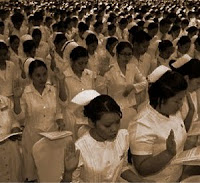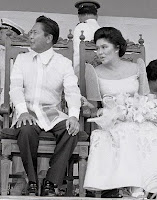Kim Komenich should know the Truth about Philippines post-Edsa Revolution
 American photojournalist Kim Komenich is out looking for the subjects of the iconic photographs he took of the Edsa People Power "Revolution" of 1986. He even won the 1987 Pulitzer Prize for Spot News Photography for his trouble. Poor guy, though. He has no idea what a big joke Filipino-style street "revolutions" had since become -- a testament to Da Pinoy's renowned talent for perverting otherwise noble endeavors.
American photojournalist Kim Komenich is out looking for the subjects of the iconic photographs he took of the Edsa People Power "Revolution" of 1986. He even won the 1987 Pulitzer Prize for Spot News Photography for his trouble. Poor guy, though. He has no idea what a big joke Filipino-style street "revolutions" had since become -- a testament to Da Pinoy's renowned talent for perverting otherwise noble endeavors.For the documentary film "Revolution Revisited" that Komenich is reportedly producing, this much about it GMANews.tv reports:
"The goal is to not only look for people, but also to ask the question, what happened after 25 years to this particular person? In this whole series there's a range of stories, from the powerful to the poor," says Rick Rocamora, a U.S.-based Filipino documentary photographer and close friend of Komenich who has been helping contact some of the subjects for "Revolution Revisited."
Since no one else will do the job of breaking the bad news to him, I will.
Mr Komenich, spare yourself the trouble of "researching" this "revisit". The situation in the Philippines is quite simple, really:
Twenty five years after this "revolution", the same "powerful" folk are still powerful, and the same poor people are still poor.
Perhaps Mr Komenich should speak to Jim Paredes, a big-time Filipino celebrity who not only was there, but contributed mightily to turning the 1986 "revolution" into the towering Aquinoist brand that it is today. Yet in May of 2007, Jim published a blog that described this rather revealing epiphany of his:
Writers have described life in the Philippines as 'magic realism', the same way Gabriel Garcia Marquez’ sees life in Latin America. The child in us lives in a mythic, magical world where we expect a handsome prince to save us at the last minute, or that things will get better with the wave of a magic wand, without any need for us to change.
I have news for us: Things will not change, not until the party wears out and a more responsible archetype takes over who will want to clean up the mess we’ve made.
Jim Paredes famously tore up his United States Green Card in the midst of the euphoria following the "success" of the 1986 Edsa "Revolution". Yet today he finds himself taking up permanent residence in a suburb of Sydney, Australia.
Indeed, the fact that Noynoy Aquino himself is President today by itself exhibits how very little progress in the way Filipinos regard their role as Voters in this "democracy" that was supposedly "achieved" by this "revolution" has been made.
There is one thing right about what Mr Komenich observes so far after "interviewing around 11 subjects for the film", and that is the sense he gets of how much Filipinos continue to latch on to this relic of 1980's thinking...
Kim says he gets a sense that People Power is still very much a source of hope for Filipinos.
"The rollercoaster of the different governments that have come in, they were varying levels of the same old thing. And I think now, with President Aquino today, I think there is this kind of renewed sense of hope that a lot of the old ways might change."
That's spot on, and the easy part. The hard part comes when we come to regard this question which no one has as yet answered convincingly:
Hope in what exactly?
When someone who matters does step up to the challenge of coming up with an answer to that question, then perhaps we will truly have earned the right to be hopeful.




i think as a filipino, you should start thinking as an optimistic one. it doesn't mean that if we are like this 25 years after the edsa revolution, we will be like this forever. yes, 25 years is indeed long - but i think our generation will make a difference, far different from what the previous generation has done. we should start by thinking positive.
ReplyDeletei admire mr. komenich for doing such a great job. it's a shame for us filipinos that citizens of other countries try their best to review our history that most of filipinos don't like to do.
I can say that nothing will change after one or two generations. The Philippine government and us citizens are too corrupt. We love shortcuts and lack love for our country. Change will happen if all political dynasties is removed from power, including the Aquino's and its relatives. Change will also happen Filipinos are "FORCED" to follow the law. I don't know how, but I think the word "force" is spot on.
ReplyDeleteFilipinos are not scared to break the Law because they know that punishments are not that severe compared to what they can get when braking it.
......If they were caught, they will use what they got from braking the law and use it to get out of trouble. I think that's the right cycle for our justice system.
ReplyDeleteby the way, love the "Hope in what exactly?" got me thinking. And have no answer.
Indeed, there is a big difference between being a democratic people in form and being so in substance. Also, freedom by and in itself is meaningless without a commensurate understanding of the responsibilities it entails.
ReplyDelete